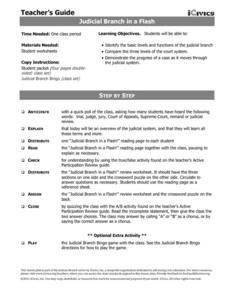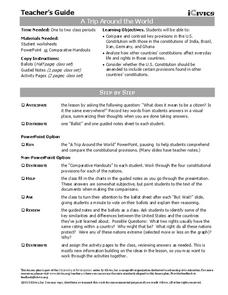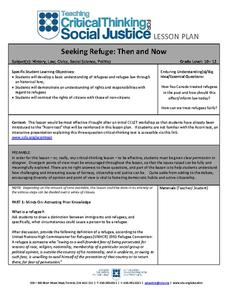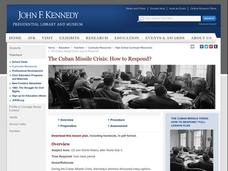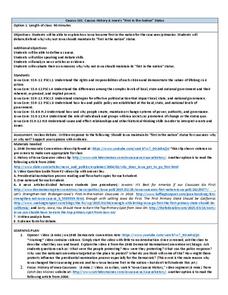Speak Truth to Power
Elie Wiesel: Speaking Truth to Genocide to Power
Invite your learners to discover the efforts of Night author Elie Wiesel to promote awareness of genocide in the world. After watching and reading an interview of Elie Wiesel, high schoolers work to create a living Holocaust museum by...
iCivics
For The President, All In A Day's Work
How does the president of the United States get the authority to exercise his/her duties? What responsibilities and tasks go into a hard day's work for the president? Here is a lesson plan that includes several instructional materials...
iCivics
Limiting Government
While this instructional activity includes several nice worksheets to identify and discuss the various limits on government (i.e. a constitution, the rule of law, separation of powers, consent of the governed, etc.), its main value lies...
iCivics
Why Government?
Why do people create governments? Where did we get our ideas about government? This is a fantastic introductory instructional activity for your American government class that begins by reviewing the philosophies of Thomas Hobbes and John...
iCivics
Wanted: A Just Right Government
What type of government did American colonists gain and seek after gaining their independence after the Revolutionary War? Here is lesson that will guide your young learners through the new nation's progression from the Articles of...
iCivics
Judicial Branch in a Flash
What is the difference between the federal court and state court systems? What about criminal versus civil cases? Check out this resource that will offer your class members a general and effective overview of the judicial branch in the...
iCivics
Yeah, But...
Impress upon your young learners the importance of formulating counter arguments based on facts and not opinions. This resource is meant to strengthen arguments designed in a previous lesson, but could also be used as a stand-alone...
iCivics
Emphasize Minimize
Encourage your class members to consider what points they are really emphasizing when they are making an argument, whether in writing or in speech. Watch out though, as this lesson may just leave your learners eager to debate you!
iCivics
Foreign Policy: War
What is the difference between foreign and domestic policy? What are the primary differences in what the United States hopes to accomplish through foreign aid, the military, and the creation of treaties? Your class members will examine...
iCivics
No Rambling Allowed
What makes for a strong persuasive argument? Organization! After deconstructing a sample argument and then following the guidelines of an included worksheet, your class members will learn how evidence can be organized in order to produce...
iCivics
Voting in Congress
In a role-play activity acting as members of either the Senate or House of Representatives, class members will vote on bills to halt mail delivery on Saturdays in the United States and to raise the minimum wage. Through an included...
iCivics
Separation of Powers
In a fun and informative simulation, your learners will act in groups as lead chefs, menu writers, and nutrition inspectors in deciding a new school lunch menu. They will then compare and contrast their experience to the interaction...
iCivics
Students, Engage!
Discuss as a class some problems that you would like to see changed in your school or community, and then take action! After your young citizens determine the appropriate steps they should take to accomplish their objectives, they will...
iCivics
A Trip Around the World
How do the rights of citizens in other countries, such as India, Germany, Brazil, and Iran, compare to those of Americans? Take a closer look at the provisions of various foreign constitutions, and compare and contrast the protections...
iCivics
Conflict & Cooperation
Considering such conflicts as the Vietnam War and the war in Afghanistan, what motivates nations to cooperate? Your class members will analyze past and current international events in order to understand the types of conditions and...
Curated OER
What is Meant by Returning to Fundamental Principles?
What did the Founding Fathers mean by the importance of continually returning to fundamental principles? Your young historians will analyze a series of quotations illustrating the fundamental ideals and principles of the United States...
Canadian Civil Liberties Education Trust
Seeking Refuge: Then and Now
Participants examine refugee law and policies and read several case studies to prepare for a discussion of this hot-button issue. The packet includes a wide range of materials representing a variety perspectives.
Virginia Commonwealth University
General Construction Measurement and Dimensions
Learners construct their understanding of measurement and dimensions in this step-by-step approach that begins with an all group vocabulary introduction, consisting of measuring objects and dialoging using measurement vocabulary....
Delegation of the European Union to the United States
Structure of Government within the EU
The political system of the European Union is historically unique and has been constantly evolving. To better understand the structure of the EU, class members compare the EU's branches to those of the United States Federal Government.
Delegation of the European Union to the United States
The Single Market and Free Trade
What are the benefits of a single EU market? Class members conclude their examination of the European Union by focusing on the single market concept designed to bring down barriers, create more jobs, and increase prosperity.
Caucus 101
Linkage Institutions: Interest Groups: Option A
How are elections really run and won? Learn about special interest groups, super PACs, and lobbyists with an engaging lesson plan about the caucus process. Young voters research specific interest groups and analyze their part in previous...
John F. Kennedy Presidential Library & Museum
The Cuban Missile Crisis: How to Respond?
For 13 days, the United States stood on the edge of nuclear War. The Soviet Arms buildup in Cuba is the focus of an activity that asks groups to analyze how the governmental role each of John F. Kennedy's advisors played went on to...
Caucus 101
Caucus History and Iowa’s “First in the Nation” Status
What is a caucus? Why is Iowa's first? Why did Iowa shift to the caucus format? After researching these basic questions, class members debate the question of whether or not Iowa should maintain its "first in the nation" status for caucuses.
Museum of Tolerance
Citizenship Then and Now: Comparing Ancient Rome and Contemporary American Society
Class members research citizenship in Ancient Rome and in the United States and use the provided graphic organizers to compare the rights and responsibilities of citizens in these two democracies.
Other popular searches
- Civics and Economics
- Introduction to Civics
- Social Studies Civics
- Civics Political Cartoons
- Civics Project
- Civics Lesson Plans
- American Civics
- Civics Business
- Civics Civil War
- Civics Citizen
- U.s. American Civics
- Civics 2008 Election







